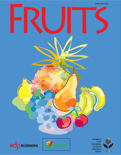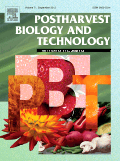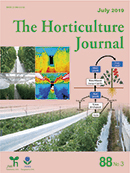
Fruits
metrics 2024
Fostering Sustainable Practices Through Rigorous Research.
Introduction
Fruits, published by the International Society for Horticultural Science (ISHS), is a pivotal journal in the fields of Agronomy, Food Science, and Horticulture. Since its inception in 1995 and with a continued publication from 2001 to 2024, this journal provides a platform for innovative research and advancements related to fruit science, covering an array of topics from cultivation techniques to post-harvest processing. With an ISSN number of 0248-1294 and an E-ISSN of 1625-967X, *Fruits* engages a global audience, operating out of France and serving as a vital resource for academics, industry professionals, and students alike. Despite its current categorization as Q4 in Agronomy and Crop Science and Q3 in both Food Science and Horticulture, the journal is committed to fostering high-quality research and enhancing its visibility within the academia, as reflected in its Scopus rankings. Readers can expect rigorous peer-reviewed articles that contribute significantly to the understanding of fruit-related science, ultimately driving the advancement of sustainable practices in the field. Emphasizing accessibility, while currently not open access, *Fruits* remains dedicated to disseminating valuable knowledge to enhance the communal pursuit of excellence in horticultural research.
Metrics 2024
 0.20
0.20 0.40
0.40 0.70
0.70 38
38Metrics History
Rank 2024
Scopus
IF (Web Of Science)
JCI (Web Of Science)
Quartile History
Similar Journals

Ornamental Horticulture-Revista Brasileira de Horticultura Ornamental
Cultivating Knowledge in Ornamental HorticultureOrnamental Horticulture - Revista Brasileira de Horticultura Ornamental, published by the SOC BRASILEIRA FLORICULTURA & PLANTAS ORNAMENTAIS, serves as a premier platform for disseminating high-quality research in the field of ornamental horticulture. With an Open Access model in place since 1995, this journal ensures that valuable findings in horticultural science reach a wide audience, fostering greater collaboration within the global community. Based in Brazil, this journal primarily focuses on the cultivation, management, and improvement of ornamental plants, contributing significantly to both the scientific and practical aspects of the horticulture industry. It has achieved esteemed rankings, including being classified in the Q2 quartile for Horticulture and Q3 for Plant Science in 2023, demonstrating its academic rigor and relevance. Scopus ranks it at 54th in Horticulture and 278th in Plant Science, positioning it among leading scholarly resources in these fields. The journal is committed to advancing knowledge through innovative research that aids in the sustainable development of ornamental horticulture practices.

AMERICAN JOURNAL OF POTATO RESEARCH
Uncovering the Science Behind Sustainable PotatoesAMERICAN JOURNAL OF POTATO RESEARCH is a prominent scholarly journal dedicated to the field of potato research, encompassing vital areas of Agronomy and Crop Science. Published by SPRINGER, this journal holds an impactful presence in the scientific community, as evidenced by its placement in the Q2 quartile of both Agronomy and Plant Science categories for 2023. With a Scopus rank of #145 out of 406 in Agricultural and Biological Sciences, it offers a significant platform for researchers, professionals, and students alike. Covering diverse topics from cultivation techniques to pest management, the journal aims to advance understanding and innovation in potato science, facilitating the sharing of cutting-edge research and fostering collaboration among scholars. Accessible to a global audience, the journal encourages the dissemination of knowledge through its open-access options. Since its inception in 1998, the AMERICAN JOURNAL OF POTATO RESEARCH has been committed to contributing valuable insights that drive the industry forward and support sustainable agricultural practices.

POSTHARVEST BIOLOGY AND TECHNOLOGY
Exploring Multidisciplinary Solutions for Postharvest ChallengesPOSTHARVEST BIOLOGY AND TECHNOLOGY is a leading journal published by Elsevier, focusing on groundbreaking research in the fields of Agronomy, Food Science, and Horticulture. With an impressive impact factor and quartile rankings of Q1 in 2023 across all three disciplines, it is recognized for its significant contributions to enhancing postharvest processes and technologies. The journal offers a platform for multidisciplinary exchange, welcoming studies that explore innovative methods to improve food quality, shelf life, and safety. Researchers and practitioners alike will find valuable insights in its extensive archives, which encompass studies from 1991 to 2024. While it is not an open-access journal, subscribers gain exclusive access to high-impact articles and critical reviews that facilitate advancements in the sector. Based in the Netherlands, at Radarweg 29, Amsterdam, this esteemed publication is essential for professionals who aim to stay at the forefront of postharvest biology and technology.

Sugar Tech
Connecting Researchers to Drive Sugar Tech ForwardSugar Tech, an esteemed journal published by SPRINGER INDIA, is a leading platform for scholarly research in the field of agronomy and crop science. Established in 2003, the journal has rapidly gained recognition, attaining a solid Q2 ranking in the highly competitive category of Agricultural and Biological Sciences according to the 2023 metrics. With an ISSN of 0972-1525 and an E-ISSN of 0974-0740, Sugar Tech contributes significantly to the dissemination of knowledge related to sugarcane production, processing, and technological advancements, catering to a global audience of researchers, industry professionals, and students. The journal facilitates an open forum for the exchange of innovative ideas and findings, encouraging the advancement of sustainable practices within the sugar industry. With Scopus ranking indicating a percentile of 67th among 406 journals in its category, Sugar Tech serves as an invaluable resource for those dedicated to exploring and addressing challenges faced in the agronomic sector.

Turkish Journal of Field Crops
Transforming Agriculture Through Cutting-Edge ResearchTurkish Journal of Field Crops is a prestigious peer-reviewed publication dedicated to advancing the field of agronomy and crop science, published by the Society of Field Crop Science. With an ISSN of 1301-1111, this journal serves as a crucial platform for researchers and professionals to disseminate innovative findings and discuss practical applications in crop cultivation and management. Hailing from Turkey, it aims to address the pressing challenges facing agriculture in both regional and global contexts, particularly over its converged years from 2009 to 2024. As a Q3 ranked journal in the Agronomy and Crop Science category with a Scopus ranking of #259/406 and a percentile of 36th, it fosters high-quality research that contributes to the sustainable development of field crops. Though it operates under various access options, this journal is committed to providing valuable insights into agronomic practices, aiming to bridge the gap between theory and application for scientists, educators, and practitioners alike.

Horticulture Journal
Connecting Researchers to Sustainable SolutionsThe Horticulture Journal, published by the Japan Society for Horticultural Science, is a leading academic platform dedicated to the advancement of horticultural research and practices. With an ISSN of 2189-0102 and an E-ISSN of 2189-0110, this journal endeavors to publish high-quality research that emphasizes innovative techniques, sustainable practices, and the science of plant cultivation. The journal has been recognized for its impact within the field, currently holding a Q2 ranking in Horticulture and a Q3 ranking in Plant Science as of 2023, indicating its significant contribution to advancing knowledge. With its open-access model, researchers, professionals, and students have the opportunity to engage with the latest findings, thanks to the journal's commitment to widespread dissemination of information. Since its convergence period began in 2015 and continuing through to 2024, the Horticulture Journal remains instrumental in promoting sustainable and beneficial practices in horticulture science globally.

Zeitschrift fur Arznei- & Gewurzpflanzen
Bridging Academia and Industry in Plant ResearchZeitschrift für Arznei- & Gewürzpflanzen, published by AGRIMEDIA GMBH in Germany, serves as a vital platform for the dissemination of research in the fields of agronomy, food science, and plant science. With an ISSN of 1431-9292, this journal focuses on the study and application of medicinal and aromatic plants, making significant contributions to both academia and industry. Although it is classified in Q4 quartiles across its relevant fields for 2023 and has a Scopus ranking that places it in the lower percentiles, the journal offers a crucial resource for understanding the ongoing developments and research challenges in herbal medicine and crop enhancement. It aims to provide a comprehensive view on various aspects of herbal studies, including cultivation, pharmacological properties, and their implications for food science, thus appealing to researchers, professionals, and students involved in plant research, agriculture, and nutrition. For access information, please refer to the journal's official web portal for details on subscription and submission guidelines.

Acta Scientiarum Polonorum-Hortorum Cultus
Nurturing the Future of Horticultural Science.Acta Scientiarum Polonorum-Hortorum Cultus is a notable open-access journal dedicated to the field of horticultural science, published by UNIV LIFE SCIENCES LUBLIN in Poland. Since its inception in 2002, it has aimed to disseminate high-quality research findings, innovative methodologies, and advancements in the horticultural sector. The journal is indexed in Scopus and has ranked in the 33rd percentile for Horticulture and the 25th percentile for Plant Science, indicating its growing influence and relevance within the scientific community. Despite the challenges presented in quartile categorizations, Acta Scientiarum Polonorum maintains a commitment to cultivating knowledge and fostering collaboration among researchers, professionals, and students in the agricultural and biological sciences. With its publication timelines spanning from 2008 to 2024, the journal serves as a vital resource for those interested in the latest horticultural trends, sustainable practices, and scientific inquiries that drive the field forward.

Molecular Horticulture
Pioneering Discoveries in Sustainable Horticultural PracticesMolecular Horticulture is a prestigious journal published by SpringerNature, dedicated to advancing knowledge in the fields of Agronomy, Crop Science, Horticulture, and Molecular Biology. Based in the United Kingdom, this journal, with ISSN 2730-9401, is recognized for its high-quality, peer-reviewed research and has rapidly established itself within the academic community, achieving a remarkable Q1 ranking across its relevant categories as of 2023. With a strong focus on innovative research that explores the intersection of molecular biology and horticultural science, Molecular Horticulture provides valuable insights that are essential for researchers and professionals aiming to enhance crop production and sustainability practices. As part of the Scopus database, the journal ranks impressively within its fields, holding notable positions such as Rank #7 in Horticulture and Rank #42 in Agronomy and Crop Science. While currently published through traditional access models, the journal remains accessible to a wide audience of scientists, educators, and students eager to stay informed on the latest discoveries and trends in plant science.

SPANISH JOURNAL OF AGRICULTURAL RESEARCH
Exploring Solutions for a Greener TomorrowThe Spanish Journal of Agricultural Research (ISSN: 1695-971X, E-ISSN: 2171-9292), published by the prestigious Consejo Superior Investigaciones Cientificas (CSIC), serves as a vital resource for those engaged in the fields of agronomy and crop science. Established as an Open Access journal since 2003, it aims to foster the dissemination of innovative research and practical applications related to agricultural practices and sustainability. With its Q3 category in Agronomy and Crop Science and a Scopus ranking of #224 out of 406, the journal provides an accessible platform for scholars to share valuable findings that enhance agricultural productivity and environmental stewardship. Covering research from 2006 to 2024, this journal continues to be instrumental for researchers, professionals, and students eager to remain at the forefront of agricultural science advancements.